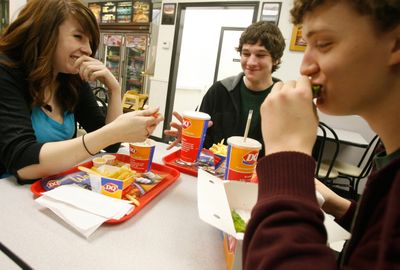Teens are feeling pinch of economic slump

BOISE – Katy Sword traded her newer Dodge Stratus and car payments for a beat-up Mazda pickup she owns outright.
And still the Borah High School senior – who works two jobs to pay for gas, insurance, food and clothes – said it’s difficult to find money for band trips and extra school expenses.
She’s already written off a graduation event at a local amusement center that costs students $50 apiece.
“I don’t have $50. I can’t go,” she said. “In order to just get by, I cut just about everything.” The economic crisis has hit teenagers just as hard as their parents – from work and spending to education choices.
They’ve lost jobs or had hours cut. They’re finding adults competing with them for the jobs in retail and fast food that they used to dominate. They say they are driving less, carpooling or biking, eating out less often and at cheaper places, and hanging out at friends’ homes or parks instead of going out.
“I got the overall feeling that kids aren’t doing anything anymore,” said Sword, who wrote an editorial on the issue for her school newspaper. “They don’t leave to go to lunch, no movies. The majority of the student body is feeling the pinch.”
“In the summer I had a job, everything was fine, I was paying my own bills,” the 17-year-old said. “As soon as I lost my job, I understood how important money was.” She said the loss added to the family stress of her mother’s long-term illness and the potential volatility of her dad’s job with a local airline battling high fuel prices in a declining economy.
“This has been one of the hardest years for me,” she said.
Twice as many people younger than 22 in Idaho claimed unemployment in January this year (1,527) as did in January 2008 (748), according to the Idaho Department of Labor.
“It’s pretty bleak,” said Kathi Lecertua, a career counselor at Borah High School.
Lecertua said she usually receives phone calls from employers with part-time positions and e-mails of job lists targeted at youth, but last month there were no calls, and the list had only one job suitable for a student.
“A lot of these kids are just going to have to ride out these tough times like the adults are,” she said. “If you have a job, don’t let go of it, because you’re unlikely to find another one.”
Anna Tominaga, a 17-year-old senior graduating from Borah, agrees it’s tough. She said she’s not looking forward to the job search that heats up as school ends.
“I applied to 20 different places” last summer, she said. “But I couldn’t get a job anywhere. I was competing with 30-year-olds.” This year, she plans to broaden her search and keep going until she’s employed.
“It’s going to be whatever job will take me,” Tominaga said. “I’ll probably have to get two part-time jobs.”
Some teens have deleted their dream colleges from their lists because of tuitions and fees.
“I did get accepted to the University of Oregon and the University of Idaho,” said Borah senior Ashley Noseworthy, who plans to major in business economics as an undergrad and pursue a law degree. “And just because of the cost of out-of-state tuition, I had to stay in Idaho.” Many of her friends also were accepted to their dream universities in other states only to find there just isn’t enough money to get them there, Noseworthy said. Even attending an in-state university will require more than her family can afford, she said.
“I’m very concerned,” said Noseworthy, who will be the first in her family to go to college. “I’m pretty much relying on scholarships.”